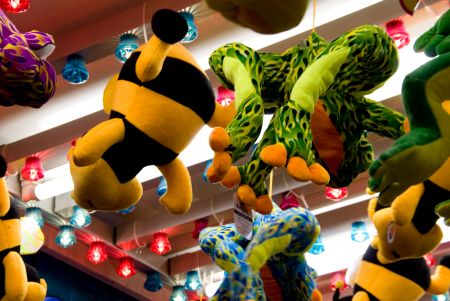How Much of Gambling is Inherent?

Anyone who has spent a lot of time in casinos can attest that there are some common threads amongst gamblers, especially amongst players who may have a problem. We all know the signs, whether it be someone who is intently trying to chase losses in order to, ‘Get back to even,’ or someone playing a negative expectation game that believes that he or she can continue to win just because they are winning so far. There are a number of systems that people employ, and perhaps (just due to variance) they may enjoy winnings in the short-term, but those systems are all but sure to fail in the long-run.
One question that could be asked is: How do these tendencies develop? It has occurred to me that, the more frequently people gamble, the more likely these tendencies are to manifest themselves, but I believe that explanation is only partially true. In reality, I think that the tendencies we have to chase losses, chase wins, only focus on wins and explain away negative results are somehow inherent. In fact, I would argue that they start in childhood.
The Claw Game
It was just another run of the mill trip to the grocery store, and we had just completed our order and checked out when my son tugged on my shirt and asked, “How about that bear with the Steelers shirt? Does it look good?”
There was no bear in the immediate vicinity that I saw placed for sale, so I was compelled to ask what bear he meant. He pointed to the claw machine and, sitting almost tauntingly on top, was the bear that he referenced.
“Buddy, right now, you can be any religion you want to, I don’t care about that. But, until you are older and capable of making an informed decision, you will not be a fan of the Pittsburgh Steelers. We don’t like the team, so why would we want the bear?”
Of course, kids are always ready for these questions, and my son responded, “Dad, you could always cut the shirt off. If you did that, it would just be a bear, it wouldn’t be a Steelers bear anymore, would it?”
I wanted my objection to hold water and did not really feel like getting into a discussion about the cost to try to get the bear against the probability of success and the resultant expected value. Actually, who am I kidding? That’s the exact discussion that I wanted to have, but you tend to lose an eight-year old when you start getting into how the long division works. Instead, I couldn’t help but smile, because while the math behind the proposition was immutable, apparently, my explanation for not trying to win the bear failed miserably.
“It’s just not a good game to try, buddy,” I stated flatly, “I could probably buy that bear four times for every one time I won it at seventy-five cents per play! It’s really not in a good position at all.”
Of course, there were occasions where I felt one of these bears, or some similar stuffed toy, was in a, ‘Good position,’ and I was likely wrong on most of those occasions. There were certainly times when I would win a toy on only the first, or perhaps the second play, but those were outnumbered significantly by the number of times that I failed to do so. I could never really know how much more I lost to those machines compared to what simply purchasing comparable toys had cost me, though, because I have a tendency to give up if I fail to win the toy after two or three plays.

As I mulled over my previous results in as much of a realistic frame as my brain, which wants to believe it has always won, would allow, my son chimed back in, “Dad, I know you can win that bear with seventy-five cents. You are awesome on the game!”
“How many times have you seen me win? Maybe twice?”
“Dad, you’ve probably won at least a hundred times by now, you know.”
“Do you have one hundred stuffed animals or more?”
“No.”
“I rest my case.”
Eventually, I managed to convince my son that the money would be better spent getting some of the crappy stale candy from the candy machines with a turn crank, or perhaps even some goofy-looking temporary tattoo that never comes off evenly, at least something where he would be guaranteed to get the item for which the money was being inserted...even if the item was still a patent rip off. He reluctantly agreed and this discussion was had in the car:
“Dad,” he began, “Thanks for getting me the candy from that machine, and the super ball, but I still think you could have won the bear.”
“You’re welcome, buddy,” I replied, “I don’t think that I could have won the bear, well, maybe eventually. What I think is more likely the case is it would take me more money to win that bear than I could pay cash for and get a substantially similar bear...maybe even one that doesn’t need its shirt cut off.”
“How much do you think the bear is worth, Dad?”
“I don’t really know, I’m afraid.” I joked, “I let my stuffed bear appraisal license expire two years ago, so I am legally not qualified to say. Just off the record, it might have been worth five bucks and would probably cost about ten bucks at Wal-Mart, or somewhere like that.”
“You could have won it for seventy-five cents, Dad, isn’t that a good deal?”
“The, ‘Could,’ is the problematic part of your statement, buddy. I could have won it for that, but in all likelihood, I probably wasn’t going to. We took the guaranteed candy and super ball for the same price, besides, that’s actually a pretty decent sized super ball. Those are better than the ones from when I was a kid, but then, those ones were only a quarter, actually, the claw game was only a quarter, too, but stuffed animals were about the same price to buy off the shelf. That’s pretty weird, isn’t it?”
My son didn’t know whether or not that was weird, but being the charming little kid that he is, he hurriedly agreed, “Yup, that’s pretty weird, Dad.”
My son had remembered only the positive outcomes from the two of us playing the claw game, but he honestly didn’t seem to recall any of the occasions that he compelled me to give the claw a try and it resulted in a losing effort. It might have something to do with the fact that the money going into the game didn’t belong to him, or perhaps it was because I hadn’t always simply offered him the ability to guaranteedly get something for the same amount of money, but for some reason, the kid legitimately could not remember me ever losing and that bothered me. I clarified the matter with him later on and, sure enough, he understands that I said that I lost before and that he believes me, but he honestly doesn’t ever remember me doing it.
He couldn’t remember the under-the-breath cursing which inevitably led to animalistic screams of frustration, and eventually, as we are all wont to do, me pulling my Beretta PX4 Storm and putting a round through the glass of every claw machine in the store.

I jest, of course, I never shot anything.
It then occurred to me that any losing events were disregarded because they are not the desired outcome, and naturally, the reward center of the brain wants the desired outcome to come to fruition. There is something about the brain that seems to believe, with enough focus or given enough trials, the desired result is almost an inevitability. I don’t necessarily believe that gamblers strictly believe that, however, I do think kids do.
The very notion is reinforced in kids all the time, if you really think about it. There can be absolutely no doubt that building up self-confidence and optimism in a kid is one of the most important things a parent can do, but are kids not always being told, “You can be whatever you want to be,” or, “If you try hard enough, you will definitely succeed.”
As parents, at least parents with both a realistic worldview and the capability to analyze the abilities of their youngsters objectively, we know that those statements are not necessarily true. My son, for example, is extremely unlikely to ever become a professional football player. The fact that he is nearly a Straight-A student with a bright academic future, as well as being a loving and charming child is immaterial to the fact that he has substantial problems with his feet (one is curved inward in an awkward way) and even surgery is very unlikely to leave him with the capability for organized sports.
I’ve obviously never told him that, mainly because he has never asked, but that is the answer, “Buddy, you can do many of the things that you may want to do if you put your mind to them, but being a professional football player is definitely not one of those things.”
“The Bear Moved, I Saw It!”
On an occasion prior to this one, there was another claw machine with another bear, or maybe it was a dog the other time, I’m not sure. Despite what is probably a poor win/loss record, I have pulled my fair share of stuffed animals out of those things, after all. Anyway, we’re going to go ahead and pretend it’s a bear, because it might as well be a bear.
My son was a little bit younger in this instance, I think he may have been about four years old, so I never should have let him go into the room with the claw machine to begin with. I asked him, “We’re going to go in and just play the Mario Kart Arcade Game, promise?” He promised, of course, but as some of you parents might know, a four-year old really doesn’t fully appreciate the implications of the word, ‘Promise,’ and only understand that, by promising, they will get the thing that they want.
We played the Mario Kart game, and then my son noticed the animal in question practically begging to be retrieved. “Can you get that bear, Daddy?”
I appraised the situation and determined, while it wasn’t in what I call a, ‘Good,’ spot, it was achievable. I no longer had sufficient quarters to play the game, so off to the change machine I went, of course, my smallest bill was also a five...so now I have five bucks in quarters.
This was probably another seventy-five cents a play machine, so sure enough, I had insufficient quarters just six short plays later. Not all of those were my fault, by the way, I actually let my son take two of the turns because he asked nicely...I probably would have had it on one of those. (Not really)
Obviously, I didn’t want to stick any more money into that machine, especially since I had decided that my earlier appraisal was wrong. My son, of course, was pulling for me, “You hit it, Daddy, the bear moved, I saw it!”
I tried to explain to him that moving the bear was irrelevant. You had to hook the claws around the bear such that the bear gets picked up and carried all the way to the drop chute, merely moving the bear was something I could have likely done blindfolded given a few seconds to memorize its position.

But, I was in it to win it, now. It would have been easier just to say, ‘No,’ on the bear before playing because, while the kid may have been a little bit disappointed, there would be no tears. Trying and failing would result in there being tears in the car because, as far as he was concerned, the mere moving of the bear indicated that me pulling it out of there was nothing short of a guarantee. I eventually decided to break a twenty, but was only going to use two singles out of that giving me $2.50 in quarters and enough for three plays. Fortunately, one of those plays was successful. Had all three of those failed, who knows what I would have done upon seeing the tears begin to well up…
Of course, that’s the, ‘Close call,’ that slot players are all used to, or perhaps even video poker players who play at a disadvantage and somehow believe that ending up with four-to-a-royal (assuming they didn’t get some other kind of win) somehow has greater value than ending up with no pairs, flushes, straights and nothing-to-a-royal. Given that I got so close, the win had to be coming, right?
Such is an example of the tendency to chase losses as the prize appears to loom ever nearer. It might perhaps be true that one of the bumps I put on that bear put it in a slightly more retrievable position, but I really cannot know that for sure. It certainly didn’t look as though the bear’s position was improving as I went for it. It looked like I was going to put seventy-five cents in, and lose seventy-five cents almost immediately.
Slots almost stand in marked relief, if you really think about it. Not only do the vast majority of slots have a better expectation per play, (looking at the actual value of the bear as the potential positive return on a $0.75 cent bet) but many of them are now designed such that it is not a win-or-nothing proposition.
The one thing that I do know is that, from a gambling standpoint, I did not provide a good example on that day. Unless I knew I was at an advantage, I really shouldn’t have been trying to get that bear in the first place. Any tendency that might exist to chase losses and believe one is closer to the win than one actually is could only have been reinforced by the fact that I didn’t give up trying for that bear. That I eventually won the bear is irrelevant, because all that would seem to indicate is that one is going to come out ahead given enough attempts, and that is never true.
Four-year-olds have no conception of the value of money, other than a few coins to jangle around and feel, ‘Rich,’ the only conception of value they have is subjective: A stuffed animal definitely has value. The logical link that is established at that age, then, is that the bear does, in fact, have a greater value than the money that goes towards attempting to win it. Otherwise, why would Dad try to use his money to get it?
Do It Again, Dad!
Of course, losing several times before eventually winning on the claw game is far from a given. On rare occasions, people can win on the first try, and perhaps, win a handful of times in the first few tries. One particular occasion happened in the same store in which, on the first two plays, I pulled out stuffed animals back-to-back. While I may have been wrong and just got, ‘Lucky,’ I do recall that I believed the first of those two was in a very strong position.
My son was older at that time, I think he may have just turned six, and he was finally starting to appreciate the needs of his sister. Of course, being about two-and-a-half right around this time, she had little to no difficulty expressing that she wanted something. While she did not accompany us on this particular shopping trip, my son suggested, “Maybe you can win two for my sister?”
I laughed at him, “Buddy, I already did win two stuffed animals! Don’t you think I should just give you one and give your sister the other one?”
“Can I pick which one I want?”
“You absolutely can because you are actually here with me, but make sure to at least let her hold the one you pick a little bit if she likes it better.”

The obvious thing here is not that my son didn’t want to share, whether there be a total of two animals, or four, he had absolutely no problem with sharing. His assumption was, since I won two animals so easily, I could just as easily double that number...that and the lack of appreciation for the value of money as I have already mentioned. The point is that he truly believed that success was going to follow success for no reason other than the fact that success had now become the expectation, losing was an anomaly.
Conclusion
I think that erroneous gambling concepts, those that have nothing to do with mathematical expectation, and can cause us to expect that which cannot, in fact, be expected are embedded into us at a young age. Of course, there are other examples of gambling being instilled into us as children, such as Chuck E Cheese which I wrote what many found to be an amusing post/thread about here:
http://wizardofvegas.com/forum/off-topic/other-casinos/12965-the-worst-casino-ever-comic-relief/
The point is that gambling, in one form or another, as well as all the failings in logic and reason that occasionally come with it, surround us all from a very young age. I might be over exaggerating the long-term effects that such forms of gambling may have on some of us as adults, and I really haven’t found anything in the way of a study that alludes to the point that I am trying to make, or I would have cited it. If you have any thoughts on how these erroneous concepts that influence gambling in our adult lives might become inherent when we are in our formative years, please share them in the comments section below, as well as any other examples you might think of that I might have missed or not noticed.
Comments
I wonder if the kids' arcades at casinos have prizes that are super easy to win. It would be such a sneaky way to "teach" kids that gambling is fun and lucrative.
Plus it would likely keep them happier while parents are off gambling.
Ha! I remember going to Circus Circus in Reno with my family when I was 9. I thought it was the best place ever! I don't remember if the midway games were any easier to win than those at the fair or not. I'm pretty sure the game operators had more teeth, though.
Wow, Mission, I used to think I was pretty good at the crane game. Now I wonder if it was all selective memory! I can still spot the "gettable" prizes, and within one or two tries, realistically determine my chances of eventual (or continued) success by gauging the "sensitivity" of the claw.
I once cleared out the jewelry crane game at Dave & Busters. We were with a large group and I made sure each of the ladies in our group got something! Mrs. Joeman still has the "gold" bracelet I won for her there (years before she became Mrs. Joeman). She pulls it out on occasion, but says she can't wear it for too long as it turns her skin various unnatural colors.
And stop making me feel old! Superballs were only a dime when I was a kid! ;)
MrGoldenSun,
As you will see in my upcoming Golden Nugget AC review, they sure do have easy to win prizes! Of course, we didn't dump the kids in the arcade, but were down there with them.
Joeman,
I imagine they were probably a little easier to win, and didn't the sight of the slot machines appeal to you, even at that age?
Not just the sensitivity of the claw, but also, whether or not the darn thing actually grasps! I have seen many prizes that would be easily winnable if the claw actually applied any degree of pressure whatsoever, but sometimes it doesn't.
How much did it cost to clear out?
Correct about the appeal of the slot machines, but just the thought of going to a casino was exciting for me, even though I knew I couldn't play. Even at that age, I was pretty familiar with casino games and concepts. I knew BJ, poker, and basic craps. I guess I'm proving your thesis here! ;)
On the same trip at a small casino in Carson City, I pulled what must have been my very first AP casino play! :) The casino floor was fairly small, and was connected to the hotel lobby. My Dad left to go ask about lunch or something, and the rest of us waited in the lobby, but with the slot machines in clear view. While we were waiting, my sister and I spotted a VP machine whose game had been dealt, but not drawn. Nobody had been by the machine the whole time we stood there. So, when Dad returned, we pointed it out, and he went over and drew two pair! That netted my sister and me two nickels apiece!
Yes -- claw sensitivity AND strength!
It's probably been 10 or more years since the D&B jewelry "heist." I would say maybe 2 tries for each piece, 4-5 pieces total. It could just be that selective memory kicking in again, though!
OK, maybe "cleared out" was an exaggeration! ;)



